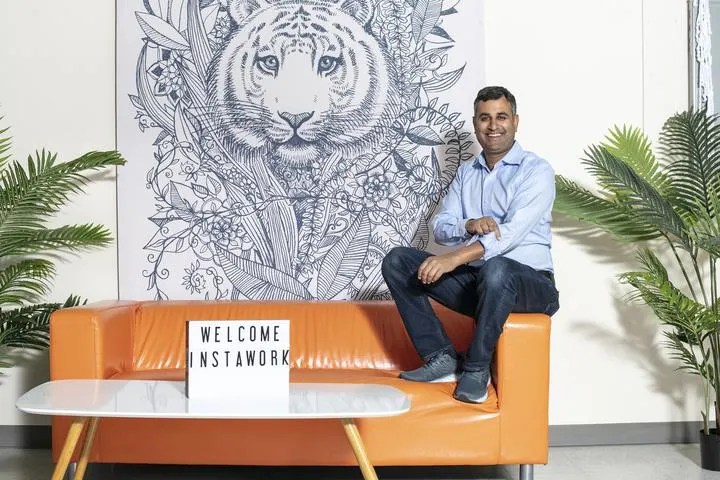While some are predicting people will lose jobs due to artificial intelligence, Instawork cofounder and CEO Sumir Meghani wants to use AI to make better matches between people and work, raising fresh capital to accelerate the use of AI and machine learning in its operations.

The San Francisco-based company, which pairs hourly workers to companies that need to fill shifts, announced a $60 million Series D Thursday to expand its use of AI, saying it will help better identify and match workers with shifts on its mobile app and platform.
The funding round, which was led by venture capital fund TCV and includes investors such as Benchmark, Spark Capital and Greylock, brings total funding to $160 million, and values the company at $760 million, according to Instawork.
Meghani says the company—named to Forbes’ Next Billion Dollar Startups list in 2022—wasn’t looking to fundraise, noting the company had plenty of cash left from its 2021 $60 million Series C and that business has been growing quickly. Yet “late last year, our product engineering team started getting really excited about AI,” Meghani says, and knew a fundraise would help invest in more technology.
The round comes at a time when fundraising by venture capital firms has declined 53% year-over-year, according to Crunchbase, and economic uncertainty remains rampant. PitchBook’s latest report cites hiking interest rates, a lack of liquid cash via public markets and the “newly added stress of regional bank collapses” as reasons for the tough dealmaking waters.
With public market valuations down, it’s “freaked out a lot of growth investors,” says Nabeel Hyatt, general partner at Spark Capital, a venture capital firm that’s invested in Instawork since its Series B round. Plus, “layoffs in the tech sector have weakened enterprise software buying.”
But Gautam Gupta, general partner at TCV, believes the job-matching platform “is just getting started,” and investors are looking at its potential for long-term success. Spark Capital’s Hyatt also says Instawork is exceeding growth expectations, “so there is a way to buck the trend.”
Amid waves of layoffs facing white collar employees, many sectors with large hourly workforces are still struggling to hire, with the leisure and hospitality industry adding 31,000 jobs in April and food services and bars adding 25,000, according to the latest jobs report from the Labor Department. (Instawork aims to help hourly employees find work and businesses manage staffing shortages by filling open shifts in job categories like warehousing, hospitality and food services.) A 3.4% unemployment rate remains that matches January’s 54-year low.
With data on its 4 million employee users, Instawork plans to expand the use of machine learning AI in its algorithm, hoping to better pair workers with specific jobs based on skill and reliability, such as open shifts at restaurants that need extra dishwashers or sports stadiums that need seasonal concession workers. Its intent is to give workers more choice on when, where and how they work, Meghani says, and companies more reliable workers by matching those who are consistently productive and on time.
Meghani says the funds will also be used to build AI-powered training and certifications for workers looking to upskill. Users will be able to look at the skills listed on job postings and determine what they want to learn, and then use Instawork’s resources to seek higher paid jobs on the platform, says Meghani, who left Groupon in 2016 with the goal of helping hourly workers find jobs.
When companies look to hire white collar or senior executives, they have ample resources such as LinkedIn and recruiters, Meghani says, but fewer resources when hiring hourly workers or filling open shifts. He hopes the funding will expand that access. Says Meghani: “Job marketing for blue collar labor is very broken.”
This story was first published on forbes.com and all figures are in USD.
Forbes Australia issue no.4 is out now. Tap here to secure your copy or become a member here.
Look back on the week that was with hand-picked articles from Australia and around the world. Sign up to the Forbes Australia newsletter here.

